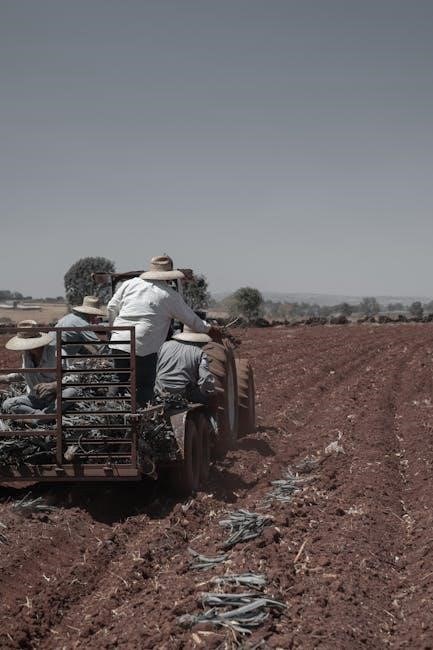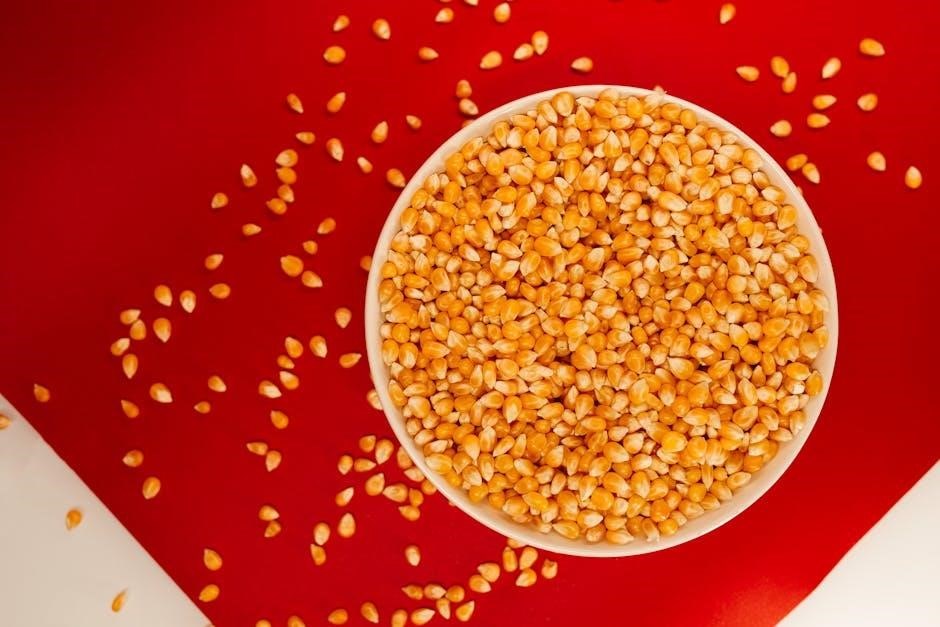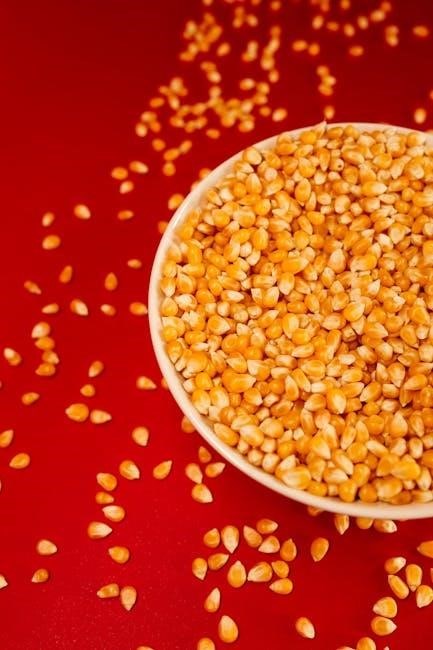dekalb corn seed guide 2024
Welcome to the DeKalb Corn Seed Guide 2024, your ultimate resource for maximizing corn yield and farm productivity․ This guide provides insights into high-performing hybrids, planting strategies, and disease management to help farmers achieve optimal results․ With a focus on innovation and sustainability, DeKalb corn seeds are designed to thrive in diverse conditions, ensuring a successful harvest season․
1․1 Overview of DeKalb Corn Seeds
DeKalb corn seeds are renowned for their high-yielding potential, drought tolerance, and robust disease resistance․ These seeds are engineered to thrive in diverse climates and soil conditions, ensuring consistent performance․ With traits like strong root systems and adaptability, DeKalb seeds are a trusted choice for farmers seeking reliability and productivity․ Their resistance to diseases such as leaf rust and Maize Streak Virus further enhances their appeal․ Whether you’re farming in challenging or ideal conditions, DeKalb corn seeds are designed to deliver exceptional results, supported by cutting-edge agronomic expertise․

1․2 Importance of Choosing the Right Corn Seed
Selecting the right corn seed is crucial for maximizing yield, adapting to environmental challenges, and ensuring long-term profitability․ The right seed choice aligns with your farm’s specific conditions, such as soil type, climate, and pest pressures․ DeKalb corn seeds are bred for high performance, offering traits like drought tolerance and disease resistance, which are essential for overcoming farming obstacles․ By choosing the optimal hybrid, farmers can enhance productivity, reduce losses, and achieve a more sustainable and successful harvest․ This decision is the foundation of a profitable and resilient farming operation․

Key Features of DeKalb Corn Seeds
DeKalb corn seeds offer exceptional yield potential, drought tolerance, and robust disease resistance, ensuring adaptability to various environmental conditions and maximizing farming productivity․
2․1 High-Yielding Potential
DeKalb corn seeds are renowned for their high-yielding potential, making them a preferred choice for farmers seeking maximum productivity․ These seeds are bred to optimize kernel production and plant density, ensuring robust growth even in challenging conditions․ With advanced genetic traits, DeKalb hybrids consistently deliver superior yields compared to other varieties․ Farmers can expect increased profitability due to improved grain quality and quantity, supported by tailored agronomic practices․ This high performance makes DeKalb seeds a reliable option for achieving successful harvests season after season․
2․2 Drought Tolerance and Stress Management

DeKalb corn seeds excel in drought tolerance and stress management, ensuring consistent performance even under water-limited conditions․ Their robust root systems and genetic resilience enable them to maintain growth and productivity when water is scarce․ These seeds are engineered to optimize water use efficiency, reducing yield loss during dry spells․ Farmers can rely on DeKalb hybrids to deliver stable results in challenging environments, making them an ideal choice for regions prone to drought or irregular rainfall patterns․
2․3 Disease Resistance (Leaf Rust, Maize Streak Virus, etc․)
DeKalb corn seeds are bred with strong resistance to prevalent diseases like leaf rust, maize streak virus, Grey Leaf Spot, and diplodia․ This built-in protection minimizes yield losses and reduces the need for fungicide applications․ By combating these diseases effectively, DeKalb hybrids ensure healthier plants, better standability, and higher overall productivity․ This disease resistance is a key factor in maintaining crop integrity and supporting sustainable farming practices, making DeKalb seeds a reliable choice for farmers facing disease pressures․
Planting Recommendations for DeKalb Corn
For optimal growth, DeKalb corn seeds thrive in well-prepared soil with proper drainage․ Plant at recommended depths and spacing to ensure healthy root development and maximum sunlight exposure․
3․1 Optimal Soil Conditions for Planting
DeKalb corn seeds excel in well-draining, fertile soils with a pH range of 5․8 to 7․0․ Rich, loamy soils promote robust root growth and nutrient uptake, while sandy soils may require additional irrigation․ Ensure soil is free from compaction and debris for optimal germination․ Proper tillage enhances soil aeration, supporting healthy plant development․ Testing soil fertility and adjusting fertilizers according to recommendations ensures balanced nutrient levels, maximizing yield potential and crop resilience․
3․2 Planting Depth and Spacing Guidelines
For optimal growth, DeKalb corn seeds should be planted at a depth of 1․5 to 2 inches, depending on soil moisture․ Ensure the soil is firm around the seed to maintain consistent contact․ Row spacing typically ranges from 30 inches, allowing for adequate sunlight and airflow․ Intra-row spacing of 8 to 12 inches promotes healthy competition and prevents overcrowding․ Proper spacing enhances root development, improves pest resistance, and maximizes sunlight absorption, leading to higher yields and better crop quality․
Disease and Pest Management
Effective disease and pest management is crucial for DeKalb corn․ Built-in resistance to leaf rust, Maize Streak Virus, and Grey Leaf Spot reduces crop threats․ Regular monitoring and timely application of controls ensure optimal yields and long-term field health․
4․1 Common Diseases in Corn Crops
Corn crops are susceptible to various diseases that can significantly impact yield․ Common diseases include leaf rust, Maize Streak Virus, Grey Leaf Spot, and diplodia․ These diseases can weaken plants, reduce photosynthesis, and lower grain quality․ Leaf rust and Grey Leaf Spot are fungal infections that thrive in moist conditions, while Maize Streak Virus is transmitted by insect vectors․ Early detection and genetic resistance, like that built into DeKalb seeds, are critical for managing these threats and ensuring healthy crop development․
4․2 Effective Pest Control Strategies
Managing pests is crucial for maintaining healthy corn crops․ Common pests include aphids, rootworms, and armyworms․ Effective strategies involve crop rotation, using resistant hybrids like DeKalb seeds, and integrated pest management (IPM)․ Monitoring pest populations and applying pesticides only when necessary helps minimize environmental impact․ Cultural practices, such as maintaining proper soil health and watering schedules, can also deter pests․ DeKalb’s disease-resistant and pest-tolerant hybrids further enhance protection, ensuring optimal growth and yield․ Regular scouting and timely interventions are key to preventing infestations and safeguarding your investment․
Choosing the Right Hybrid for Your Farm

Selecting the right DeKalb hybrid involves understanding your farm’s specific needs, including soil type, climate, and desired yield potential․ DeKalb offers a range of hybrids tailored to different growing conditions, ensuring optimal performance․ Consider factors like drought tolerance, disease resistance, and maturity rates to maximize productivity․ By matching the hybrid to your farm’s unique environment, you can achieve higher yields and better crop resilience․
5․1 Understanding Hybrid Characteristics
Understanding hybrid characteristics is crucial for selecting the right DeKalb corn seed for your farm․ Hybrids vary in yield potential, maturity rates, and stress tolerance․ Traits like drought resistance, disease immunity, and adaptability to soil types are key factors․ High-yielding hybrids often balance productivity with resilience, while shorter maturity hybrids suit regions with shorter growing seasons․ Disease resistance, such as against leaf rust and Maize Streak Virus, ensures crop health․ Farmers should assess local conditions and goals to match the hybrid’s traits, optimizing performance and profitability․
5․2 Climate and Soil Type Considerations
Climate and soil type play a critical role in determining the success of DeKalb corn seeds․ Hybrids are tailored to thrive in specific conditions, such as drought-prone areas or waterlogged soils․ Farmers in regions with moderate rainfall benefit from drought-tolerant varieties, while those in wetter climates may opt for hybrids with strong root systems to resist waterlogging․ Soil fertility and pH levels also influence growth, with certain hybrids performing better in low-fertility or high-salinity soils․ Matching the hybrid to local conditions ensures optimal yield and resilience, maximizing the farm’s potential․

Agronomic Support and Resources
DeKalb provides comprehensive agronomic support, including expert guidance, soil analysis tools, and data-driven insights to optimize corn production and address farm-specific challenges effectively․

6․1 DeKalb’s Agronomic Support Services
DeKalb offers tailored agronomic support services, ensuring farmers maximize their yields․ From soil analysis to crop monitoring, their experts provide data-driven recommendations․ With access to advanced tools and resources, growers can make informed decisions․ Regular field visits and personalized advice help address specific challenges, fostering sustainable and profitable farming practices․ DeKalb’s commitment to innovation and farmer success sets them apart, making them a trusted partner in agriculture․
6․2 Access to Expert Guidance and Tools
DeKalb provides access to expert guidance and cutting-edge tools, empowering farmers to make data-driven decisions․ Their digital platforms offer insights into soil health, weather patterns, and crop performance․ Customizable tools, like yield forecasting and seed selection guides, help optimize farm operations․ Seasonal webinars and workshops further enhance knowledge, ensuring growers stay ahead of challenges․ This comprehensive support system equips farmers with the resources needed to maximize productivity and achieve long-term success in an ever-evolving agricultural landscape․
DeKalb corn seeds offer high-yielding, drought-tolerant, and disease-resistant solutions, supported by expert guidance․ This guide equips farmers with tools to enhance productivity and sustainability, ensuring superior performance․
7․1 Summary of Benefits
DeKalb corn seeds deliver exceptional value with high-yielding potential, drought tolerance, and robust disease resistance․ They offer adaptability across diverse climates and soil types, ensuring consistent performance․ Farmers benefit from strong agronomic support, expert guidance, and advanced hybrid traits․ These seeds are engineered to maximize productivity while minimizing environmental stress․ With DeKalb, growers can achieve superior yields, reduced crop risks, and long-term sustainability․ Their innovative genetics and proven reliability make them a top choice for modern farming needs․
7․2 Future Prospects for DeKalb Corn Seeds
DeKalb corn seeds are poised for continued growth with advancements in seed genetics and technology․ Future prospects include new hybrid releases tailored to evolving climate challenges, enhanced disease resistance, and improved drought tolerance․ DeKalb’s commitment to innovation ensures farmers access to cutting-edge solutions, optimizing yields and sustainability․ With a focus on R&D, DeKalb aims to lead the industry in addressing global food demands while supporting environmentally friendly practices․ Their dedication to farmer success positions them as a key player in shaping the future of agriculture․
